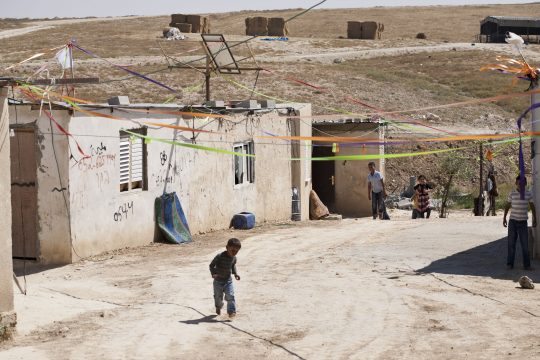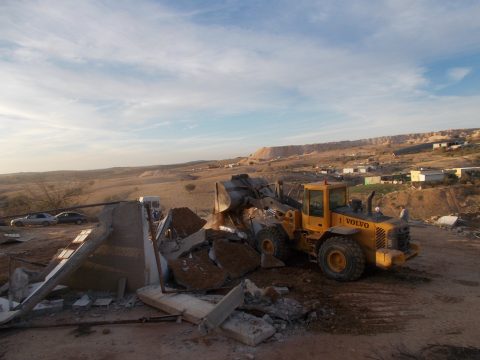
Negev Coexistence Forum for Civil Equality
פורום דו-קיום בנגב לשוויון אזרחי
منتدى التعايش السلمي في النقب من أجل المساواة المدنية
Day for the Eradication of Poverty: Out of 20 Bedouin newborns born today in the Negev, 14 will be poor // Haia Noach
01.03.2018
Government policy preserves the poverty cycle of the Negev Bedouins. Funds of the 5 year social economic plan do not reach the population but rather the enforcement bodies that only escalate the rift between the state and its citizens.
According to the National Insurance Institute report on the dimensions of poverty and social inequality, published in 2017, Israel was the poorest of the 35 OECD countries in 2016. Nevertheless, Prime Minister Benjamin Netanyahu boasts of Israel as being a high-tech cyber state. Creating such a successful image nullifies the need to confront the harsh reality by which 1,809,200 people in Israel live in poverty.
The incidence rate of poverty among the general population is 18.6%. In other words, a large proportion of Israel’s population does not benefit from the fruits of high-tech. 463,300 families, including 842,300 children, live below the poverty line, mainly from disadvantaged groups such as minorities, Ethiopians, elderly and others. Apparently, it is better not to talk about the issue of poverty since it “smells” of failure. If the government is indeed dealing with poverty, then obviously it is failing in solving the problem.
But the failure which I will address here is even greater. This year, for the first time, the National Insurance Report gives us a glimpse into the economic situation of the Bedouin population of the Negev, which was sampled distinctively this time. We find that the incidence rate of poverty amongst Bedouins amounts to 58%, more than 3 times of the general poverty. Poverty amongst Bedouin children amounts to 70%, namely out of 250,000, more than 100,000 children are poor. Out of 20 Bedouin babies born today, 14 are destined to live in poverty and the saddest of all is that the reason for this situation is not hatred but just lack of interest.
It is not at all certain that the Prime Minister sees this population, nor is he aware that the Bedouins comprise a third of the Negev’s residents, with the fate of the Bedouins and the Negev inherently linked. What will happen to the residents of the Negev if such a large group is unable to provide for themselves and their children go to bed on empty stomachs?
The shortage of health services in the Bedouin villages and the poor accessibility to them are reflected in infant mortality which is three times higher than that of the Jewish population. According to the Education Committee of the Knesset there is a shortage of dozens of kindergartens which were supposed to provide education to about two thousand children. This shortage coupled with the high dropout rates from the already dilapidated education system, does not give the Bedouin residents of the Negev a horizon or a future.
Another issue derived from this situation is of course also the question of housing which has reached the state of a real humanitarian crisis in the Bedouin villages and towns. Due to the many years of neglect and failure to resolve the issue of recognition of the villages, many of the Bedouins in the Negev live in shacks, with all its implications. Even in those villages that were recognized by the state in the past two decades, it is not possible to obtain building permits, nor are there spare lands to build. Where then are the residents supposed to live?
The government’s policy leads to destruction of hundreds of homes each year, leaving thousands of people without shelter. Those unfortunate people are forced, under enormous financial effort, to build alternative structures, otherwise they will be left out in the open with no roof over their heads. There is hardly a Bedouin home in the Negev that has not experienced a demolition with all its economic, legal and psychological implications.
On February 1st this year, members of the Yoav unit, a special police unit aimed to enforce planning and building laws that the Jews do not encounter since they “treat” only Bedouins – entered the recognized village of Um Batin near Omer. The unit accompanied the officials distributing the demolition orders in the village. Although the village has been recognized for over a decade, building permits cannot be obtained and therefore all constructions in the village are illegal and the demolition orders are distributed in spite of the fact that there are no alternative housing solutions.
The Yoav unit handed Sabha, a 70 years old woman living alone, a demolition order to her home, in which she has been living for decades, since she was renovating it for the winter. In another part of the village, the forces broke into the house of Walid, a resident of the village and father of 16 children. Walid threatened to set himself on fire and the forces retreated. In both cases, sooner or later, the demolition orders will be executed, and then Sabha and Walid will have to rebuild their homes. To do this they will have to take a loan from whoever will be willing to lend them money, or settle for a structure that is even more shaky than usual.
The state’s handling of the Bedouin population is expressed by 5 year plans which have so far not found their way to the public, but rather contributed to a huge array of enforcement agencies that only exacerbate the rift. At the end of the day no one will come to talk to the traumatized family that had to experience their home demolished, no one will provide them alternative housing and no one will take care of their poverty. Thus, the vicious and destructive cycle of poverty will continue. This is how Israel, the cyber nation, is treating its poorest population and the poor in general.
Haia Noach, Negev Coexistence Forum
Executive Director



 Youtube
Youtube
 Twitter
Twitter
 Facebook
Facebook